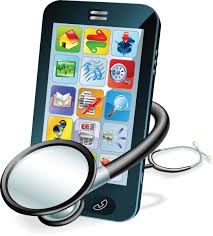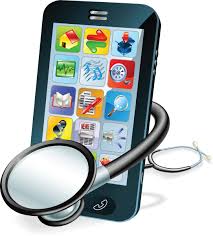
Recent studies have suggested that mobile health apps will become people’s preferred resource over physicians apart from witnessing a growing number of users.
Two-thirds of Americans have already shown a favor for digital health management over physical, according to a study by ITOnline.
The use of a wearable device to manage their health is the preference of 79 percent of Americans according to the study while 45 percent of the respondents wanted tracking of symptoms. Using such devices to manage a personal health issue or condition was desired by 43 percent of the respondents.
Healthcare was among the top 3 biggest mobile trends for 2016, a study by PricewaterhouseCoopers found out recently. US adults who own web-enabled smartphone or other wireless device have at least one health or fitness app on their smartphone. This formed the basis of the PwC conclusion which is an increase of 16% over the past two years.
The health apps have some of the highest number of downloads, the study found out.
“As user trust continues to grow for these apps, collaborations that bring together activity tracking, period tracking, weight and diet tracking will merge, with powerful overall health results. More than ever, doctors will need to connect in with the app ecosystem or be left behind,” the study states.
More women will use mobile apps to conceive than ever before, predicts a recent study by Kindara, helping with more than 75% of all pregnancies.
“There are apps to chart your fertility, suggest baby names, support your prenatal fitness, and learn about the development of the baby,” the study states. 47 percent of people using mobile health apps are already using a pregnancy related application, according to a study done by Citrix.
The Kindara study states that Women will trust their mobile health apps and communities more than their doctors.
“In 2016, we will see women steering away from doctor’s offices and into their smartphones largely due to the multitude of digital health tools that are available,” says the study report.
In that study, two-thirds of women said they would use a mobile app to manage health-related issues.
Mobile apps are becoming the primary source for women to manage treatment, diagnosis, and prevention of health conditions with growing data sets and peer-to-peer communities such as Health Tap.
2016 is going to be an explosive year for women’s health companies, says Will Sacks, CEO and Co-founder of Kindara.
“Women will continue to demand more out of their health products, and companies will need to innovate or they will be left behind,” Sacks says.
While corporations take extra mobile strides to keep employees health insurance costs down, big pharm companies are launching hundreds of mobile apps that educate users on drugs says the PWC study.
“Employers are embracing connected tools to engage employees in wellness programs and chronic disease management, and health plans are using the same to reduce spending. Drug makers have been creating apps—more than 700 so far—to connect with their customers,” says the study.
It is expected that there would be more bleeding of the other economic industries that have been historically poorly connected to each other as there is more connection between mobile health and the U.S. healthcare system, predicts the PwC study.
(Source:www.forbes.com)
Two-thirds of Americans have already shown a favor for digital health management over physical, according to a study by ITOnline.
The use of a wearable device to manage their health is the preference of 79 percent of Americans according to the study while 45 percent of the respondents wanted tracking of symptoms. Using such devices to manage a personal health issue or condition was desired by 43 percent of the respondents.
Healthcare was among the top 3 biggest mobile trends for 2016, a study by PricewaterhouseCoopers found out recently. US adults who own web-enabled smartphone or other wireless device have at least one health or fitness app on their smartphone. This formed the basis of the PwC conclusion which is an increase of 16% over the past two years.
The health apps have some of the highest number of downloads, the study found out.
“As user trust continues to grow for these apps, collaborations that bring together activity tracking, period tracking, weight and diet tracking will merge, with powerful overall health results. More than ever, doctors will need to connect in with the app ecosystem or be left behind,” the study states.
More women will use mobile apps to conceive than ever before, predicts a recent study by Kindara, helping with more than 75% of all pregnancies.
“There are apps to chart your fertility, suggest baby names, support your prenatal fitness, and learn about the development of the baby,” the study states. 47 percent of people using mobile health apps are already using a pregnancy related application, according to a study done by Citrix.
The Kindara study states that Women will trust their mobile health apps and communities more than their doctors.
“In 2016, we will see women steering away from doctor’s offices and into their smartphones largely due to the multitude of digital health tools that are available,” says the study report.
In that study, two-thirds of women said they would use a mobile app to manage health-related issues.
Mobile apps are becoming the primary source for women to manage treatment, diagnosis, and prevention of health conditions with growing data sets and peer-to-peer communities such as Health Tap.
2016 is going to be an explosive year for women’s health companies, says Will Sacks, CEO and Co-founder of Kindara.
“Women will continue to demand more out of their health products, and companies will need to innovate or they will be left behind,” Sacks says.
While corporations take extra mobile strides to keep employees health insurance costs down, big pharm companies are launching hundreds of mobile apps that educate users on drugs says the PWC study.
“Employers are embracing connected tools to engage employees in wellness programs and chronic disease management, and health plans are using the same to reduce spending. Drug makers have been creating apps—more than 700 so far—to connect with their customers,” says the study.
It is expected that there would be more bleeding of the other economic industries that have been historically poorly connected to each other as there is more connection between mobile health and the U.S. healthcare system, predicts the PwC study.
(Source:www.forbes.com)





